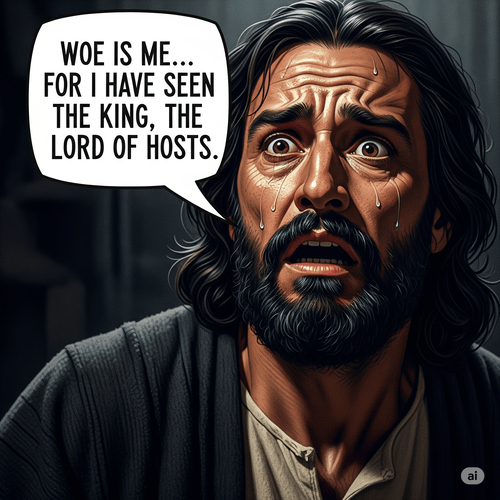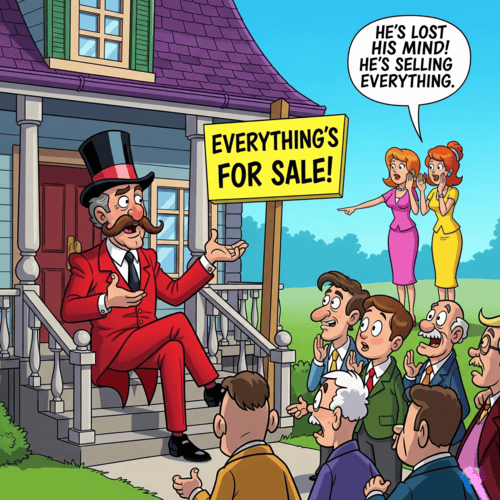‘Sell Everything You Have…’: Are We To Do So Literally?
When Jesus encountered the rich young ruler in Matthew 19:21, His words cut through with startling clarity: “If you want to be perfect, go, sell your possessions and give to the poor, and you will have treasure in heaven. Then come, follow me.” This command has troubled and perplexed Christians for two millennia. Are we all called to radical divestiture? Does faithful discipleship require literal poverty?
‘SELL EVERYTHING YOU HAVE’: UNDERSTANDING THE SPECIFIC CONTEXT
Reformed interpreters emphasise Jesus’ command to the rich young ruler was diagnostic rather than prescriptive. John Calvin noted Christ “intended to correct the false confidence in which the man was involved.” The young man’s wealth had become his functional saviour—the source of his security, identity, and hope.
Jesus, with divine insight, identified the precise idol that stood between this particular individual and wholehearted devotion to God. The command to sell everything was surgical, targeting the specific barrier preventing this man from true discipleship. As Calvin observed, Christ “applied the best remedy to his disease.”
This contextual understanding doesn’t diminish the passage’s relevance but helps us apply it appropriately. The principle transcends the specific application: whatever competes with Christ for ultimate allegiance must be surrendered, whether wealth, career, relationships, or reputation.
WEALTH AND STEWARDSHIP: REFORMED PERSPECTIVES
The Reformed tradition has consistently taught material possessions are gifts from God to be stewarded faithfully rather than rejected entirely. Calvin himself argued “riches are not forbidden, but the inordinate love of them.” The Westminster Larger Catechism affirms we may lawfully acquire and possess property, provided we do so through honest means and use it for God’s glory.
This perspective recognises wealth, like any good gift, becomes sinful only when it usurps God’s rightful place in our hearts. Abraham, Job, and Joseph were wealthy yet godly men. The issue isn’t the possession of riches but being possessed by them.
The Reformed perspective emphasises stewardship over ownership. We’re managers, not ultimate owners, of the resources entrusted to us. The stewardship model creates space for both accumulation and generosity, savings and sacrifice—provided all is done with conscious accountability to our ultimate Master.
THE DANGER OF RICHES: SCRIPTURE’S WARNINGS
While rejecting mandatory poverty, Reformed teachers have consistently warned about wealth’s spiritual dangers. Calvin noted riches “intoxicate the minds of their possessors” and create “a veil which conceals God from our view.”
The Puritan tradition, deeply Reformed in its theological roots, developed sophisticated thinking about wealth’s proper role. Richard Baxter warned “it is easier for a camel to go through the eye of a needle than for most rich men to enter heaven” while simultaneously teaching that godly diligence often leads to prosperity.
This tradition identified several specific dangers:
- Pride and self-sufficiency that forgets dependence on God’s providence. Wealth can create an illusion of autonomy that contradicts our fundamental need for divine grace.
- Hardened hearts toward the poor. Prosperity can insulate us from recognizing genuine need and responding with compassion. The rich man in Jesus’ parable couldn’t even see Lazarus at his gate.
- Misplaced security. When wealth becomes our refuge in times of trouble rather than God Himself, it functions as an idol requiring our ultimate trust and devotion.
- Distraction from eternal priorities. The “deceitfulness of riches” (Mark 4:19) chokes spiritual fruitfulness by consuming mental and emotional energy that should be directed toward God’s kingdom.
‘SELL EVERYTHING YOU HAVE’: PRACTICAL APPLICATIONS FOR TODAY
How then should contemporary believers apply Jesus’ words to the rich young ruler? The Reformed approach suggests several practical principles:
- Diagnostic self-examination. We must honestly assess what competing loyalties exist in our hearts. What would be most difficult to surrender if Christ demanded it? That attachment likely reveals our functional idol.
- Generous stewardship. While not required to embrace poverty, Christians are called to radical generosity that reflects God’s grace. This includes systematic giving, hospitality, and sacrificial care for those in need.
- Grateful contentment. Paul’s instruction to be “content with what you have” (Hebrews 13:5) challenges the endless accumulation that characterizes much of Western culture. Contentment demonstrates trust in God’s provision.
- Strategic simplicity. Some may be called to voluntary simplicity as a spiritual discipline or missional strategy, choosing to live below their means to maximise kingdom impact. This differs from mandatory divestiture but reflects similar values.
- Vocational faithfulness. The Reformed emphasis on calling means some Christians will necessarily handle significant resources through their professional roles. The key is in managing these responsibilities as stewards rather than owners.
‘SELL EVERYTHING YOU HAVE’: WHEN LITERAL APPLICATION MAY BE REQUIRED
Reformed theology acknowledges some individuals may indeed be called to embrace voluntary poverty. Missionaries often sacrifice financial security for kingdom advance. Church planters frequently live on minimal support to establish new congregations. Some Christians are gifted and called to lives of radical simplicity that bear powerful witness to Christ’s sufficiency.
The determining factor isn’t a universal command but individual calling discerned through prayer, Scripture, and wise counsel. The Spirit may lead specific believers to embrace material sacrifice as part of their unique discipleship journey.
THE GOSPEL OF GRACE, NOT WORKS
Ultimately, we must anchor this discussion in the gospel of grace. We aren’t saved by our economic choices—whether poverty or prosperity, generosity or accumulation. Salvation comes through faith in Christ alone, not through any particular lifestyle pattern.
Jesus’ encounter with the rich young ruler reveals the path to eternal life requires complete surrender to Christ as Lord. For some, that surrender includes dramatic economic sacrifice. For others, it means faithful stewardship of significant resources. For all, it demands that nothing compete with Jesus for ultimate allegiance.
The question isn’t whether we’ve sold everything, but whether we hold everything—including our wealth—with open hands, ready to release whatever Christ requires for the sake of His kingdom and glory.
‘SELL EVERYTHING YOU HAVE’: RELATED FAQs
What do contemporary Reformed scholars say about this passage? John Piper has argued that while not everyone is called to literal divestiture, all Christians should embrace “wartime lifestyle” simplicity that prioritises kingdom giving over luxury accumulation. Tim Keller emphasises Jesus was exposing the young man’s heart idolatry, noting that different people have different idols requiring different remedies. Both scholars agree the passage calls for radical heart surrender rather than universal poverty vows.
- How does this command relate to the Old Testament’s positive view of wealth? The Old Testament frequently presents wealth as God’s blessing (Deuteronomy 8:18, Proverbs 10:22), creating apparent tension with Jesus’ words. Reformed interpreters resolve this by noting Jesus was addressing the covenant curse of hardened hearts, not condemning material blessing itself. The issue isn’t possession but the possession of our hearts by our possessions—a concern equally present in Old Testament warnings about forgetting God in prosperity (Deuteronomy 8:11-14).
- Did the early church practice communal ownership based on this teaching? The Jerusalem church’s sharing of goods (Acts 2:44-47) was voluntary and situational rather than mandated communalism based on Jesus’ words to the rich young ruler. Luke specifically notes that Barnabas “sold a field he owned” (Acts 4:37), indicating continued private ownership. Reformed scholars see this as Spirit-led generosity meeting acute need rather than establishing normative economic policy for all churches.
How should wealthy Christians today apply Jesus’ diagnostic approach? Theologians suggest wealthy believers should regularly examine their hearts through questions like: “What would I find hardest to surrender?” and “Where do I turn first in times of anxiety?” They recommend practices like percentage-based giving that increases with income, periodic fasting from luxury, and seeking counsel from spiritually mature advisors who can identify blind spots regarding money’s influence.
- What about the “prosperity gospel”—how does this passage refute those teachings? Jesus’ encounter with the rich young ruler directly contradicts prosperity theology’s claim that wealth necessarily indicates God’s favour. The young man was wealthy yet spiritually bankrupt, unable to inherit eternal life despite his riches. Reformed scholars use this passage to demonstrate material prosperity can actually hinder spiritual progress when it becomes a substitute for dependence on God’s grace.
- Are there biblical examples of wealthy people who didn’t have to sell everything? Scripture records several wealthy believers who maintained their possessions while serving God faithfully: Zacchaeus gave away half his goods (Luke 19:8), Joseph of Arimathea used his wealth to honour Jesus (Matthew 27:57-60), and Lydia continued her business while supporting Paul’s ministry (Acts 16:14-15). Reformed interpreters note Jesus tailored His demands to each person’s specific spiritual needs rather than applying uniform economic requirements.
How does this passage inform Christian views on economic systems and social justice? While not prescribing specific economic policies, Reformed scholars argue this passage establishes principles for Christian economic engagement: the danger of concentrated wealth, responsibility toward the poor, and the need for economic relationships that reflect God’s character. However, they distinguish between personal discipleship calls (like the rich young ruler received) and broader social arrangements, noting that just systems can accommodate various economic circumstances while protecting the vulnerable.
‘SELL EVERYTHING YOU HAVE’: OUR RELATED POSTS
Editor’s Pick

Ephesians 1:13: Was the Spirit’s Indwelling Promised of Old?
When Paul declares believers are “sealed with the promised Holy Spirit” in Ephesians 1:13, one word jumps off the page: [...]

Monergism vs Synergism: Is Salvation God’s Work Alone?
When God saves us, does He do it alone, or does He need our help? The question isn’t mere theological [...]

Was Jesus Abandoned by the Father on the Cross?
WHY WE ANSWER IN THE NEGATIVE “My God, my God, why have you forsaken me?” These words from the cross [...]

Why Do Some Respond to God’s Call While Others Don’t?
THE REFORMED VIEW ON OUTWARD AND INWARD CALLS EXPLAINED Picture this: Two neighbours attend the same church service. They hear [...]

Does Ocean Salt Content Prove a Young Earth?
A COMPELLING LOOK AT MARINE CHEMISTRY AND EARTH’S TIMELINE The Salt Question That Challenges Deep Time: If Earth’s oceans have [...]
Noah’s Flood: Where Did All the Water Come From? And Go?
The question hits every Bible-believing Christian at some point: “If Noah’s flood covered the whole earth, where did all that [...]

No Marriage in Heaven? What Does Mark 12:25 Mean?
“Will I see my spouse in heaven? Will we still be married?” These questions pierce the heart of every Christian [...]

The Terror of Meeting God: What Isaiah 6 Reveals About Divine Holiness
WHEN ‘WOE IS ME’ IS THE ONLY PROPER RESPONSE TO A GLIMPSE OF GOD Picture this: You’re a prophet of [...]

Is the Holy Spirit Present in Unbelievers? The Biblical Answer
Can someone who doesn’t believe in Jesus Christ have the Holy Spirit living inside them? This question strikes at the [...]

The Gap Theory Exposed: Why Embrace a Young Earth?
The Gap Theory proposes there’s a vast time gap—millions or billions of years—between Genesis 1:1 (“In the beginning God created [...]






